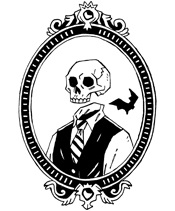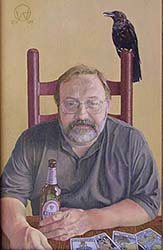Letters to Lovecraft is our newest genre-blending anthology of original fiction, and to ring in the new year for our readers we’ll be posting excerpts from each of the stories. Today’s entry comes from Kirsten Alene, and takes us to a strange university where stranger things are afoot. This may not be Miskatonic U, but credit hours from one may be applied at the other…
I have been growing bats in the attic of the faculty hall for a long time. The warm, humid atmosphere suits them, and they appear to flourish under my care. Sometimes I take their soft, fat mammalian bodies in my hand and press their chests against my cheek. They are paralyzed by the smooth softness, and the only part of them that moves is their heart, which beats as fast as the vibrato of a piccolo. The morning that the sun rises orange through the rosary window on the fourth floor of the faculty building, I am tending the bats in the attic, and I miss what transpires on the first floor, in the faculty lounge.
Someone rushes up the stairs to tell me, “Anna Beth, there’s been a fire. Anna Beth, there’s been some sort of fire.”
Downstairs the hallway is blackened and crumbling, but the walls are all intact. Teachers and students, a few aids, and a school nurse are walking around the place, expressing their dismay and despair by guttural emissions, which together add up to a general monastic hum.
Under the remains of a light fixture, which sparks benignly overhead, is a small blonde thing with ashes fluffing out from her head in a halo. She’s very dirty, and the other faculty members do not approve. Who does she think she is, running around setting fires and then becoming blackened by them? She’s just ruining the whole atmosphere of tragedy, standing there getting everything dirty where there wasn’t any dirt before.
The host of helpful faculty members who supposedly appeared when the explosion sounded are closing in on me, relaying information they think must be relevant in catlike whispers near my ears so that no one else will hear and take credit for their powers of observation.
“A sign like a snake and a cross,” says one.
“And the smoke was a bright reddish green, Anna Beth, tinged, a chemical reaction of some sort.”
“I was, of course, preparing for my lecture and then the sound… like an elephant trumpet.”
“Like a bassoon.”
“Like a man screaming.”
Then, the only really relevant piece of information comes from Peabody, a professor of Japanese ceremonial dress: “I think a man was inside.”
The little blonde child turns slowly to face Peabody. My first instinct is to remove her from the nurse’s claws, which are grasping at her, searching for wounds. But when she opens her mouth to speak, she no longer looks vulnerable at all.
“There was a man inside,” she says…
For the rest, get Letters to Lovecraft from Stone Skin Press.
Kirsten Alene is the author of three books, most recently Japan Conquers the Galaxy (Eraserhead Press, 2013). Her fiction has appeared in a number of publications in print and online, including In Heaven, Everything Is Fine: Fiction Inspired by David Lynch; Innsmouth Magazine; and New Dead Families. She lives in Portland, Oregon, with her husband, dog, and cat.
is the author of three books, most recently Japan Conquers the Galaxy (Eraserhead Press, 2013). Her fiction has appeared in a number of publications in print and online, including In Heaven, Everything Is Fine: Fiction Inspired by David Lynch; Innsmouth Magazine; and New Dead Families. She lives in Portland, Oregon, with her husband, dog, and cat.
 is a writer, editor, amateur film scholar and monster expert who was born on the night before Halloween. He’s the author of Never Bet the Devil & Other Warnings and the coeditor of Fungi, an anthology of weird fungus-themed stories. You can find out more at orringrey.com.
is a writer, editor, amateur film scholar and monster expert who was born on the night before Halloween. He’s the author of Never Bet the Devil & Other Warnings and the coeditor of Fungi, an anthology of weird fungus-themed stories. You can find out more at orringrey.com. 2011 fiction collection, Let’s Play White, was featured in io9 and received praise from Samuel Delany and Nikki Giovanni. She is also recognized for her critical analysis of genre and race issues, such as her articles, “Race and The Walking Dead” and “Super Duper Sexual Spiritual Black Woman: The New and Improved Magical Negro,” published in Clarkesworld Magazine. Chesya is currently getting her MA in African American studies at Georgia State University and is a juror for the 2013 Shirley Jackson awards.
2011 fiction collection, Let’s Play White, was featured in io9 and received praise from Samuel Delany and Nikki Giovanni. She is also recognized for her critical analysis of genre and race issues, such as her articles, “Race and The Walking Dead” and “Super Duper Sexual Spiritual Black Woman: The New and Improved Magical Negro,” published in Clarkesworld Magazine. Chesya is currently getting her MA in African American studies at Georgia State University and is a juror for the 2013 Shirley Jackson awards. and teacher turned award-winning horror author Gemma Files is best known for her Hexslinger series (A Book of Tongues, A Rope of Thorns and A Tree of Bones, all from ChiZine Publications). She has also published two collections of short fiction (Kissing Carrion and The Worm in Every Heart, both from Wildside Press) and two chapbooks of poetry. Her most recent book is We Will All Go Down Together: A Novel in Stories About the Five-Family Coven (2014, CZP).
and teacher turned award-winning horror author Gemma Files is best known for her Hexslinger series (A Book of Tongues, A Rope of Thorns and A Tree of Bones, all from ChiZine Publications). She has also published two collections of short fiction (Kissing Carrion and The Worm in Every Heart, both from Wildside Press) and two chapbooks of poetry. Her most recent book is We Will All Go Down Together: A Novel in Stories About the Five-Family Coven (2014, CZP). writes dark fantasy and horror. She is the author of the Aurealis Award–winning The Girl with No Hands and Other Tales, the WFA-shortlisted Sourdough and Other Stories and the new collection / mosaic novel (with Lisa L. Hannett) Midnight and Moonshine. Her work has appeared in such writerly venues as The Mammoth Book of New Horror 22, Australian and US Best Of anthologies, Fantasy Magazine, Lady Churchill’s Rosebud Wristlet, Dreaming Again and Steampunk II: Steampunk Reloaded. She was awarded one of the inaugural Queensland Writers Fellowships in 2013. She has a British Fantasy Award for “The Coffin-Maker’s Daughter” (from A Book of Horrors, Stephen Jones, ed.), a PhD in creative writing, and blogs at www.angelaslatter.com.
writes dark fantasy and horror. She is the author of the Aurealis Award–winning The Girl with No Hands and Other Tales, the WFA-shortlisted Sourdough and Other Stories and the new collection / mosaic novel (with Lisa L. Hannett) Midnight and Moonshine. Her work has appeared in such writerly venues as The Mammoth Book of New Horror 22, Australian and US Best Of anthologies, Fantasy Magazine, Lady Churchill’s Rosebud Wristlet, Dreaming Again and Steampunk II: Steampunk Reloaded. She was awarded one of the inaugural Queensland Writers Fellowships in 2013. She has a British Fantasy Award for “The Coffin-Maker’s Daughter” (from A Book of Horrors, Stephen Jones, ed.), a PhD in creative writing, and blogs at www.angelaslatter.com. is the author of the novels The Physiognomy, Memoranda, The Beyond, The Portrait of Mrs. Charbuque, The Girl in the Glass, The Cosmology of the Wider World, and The Shadow Year. His story collections are The Fantasy Writer’s Assistant, The Empire of Ice Cream, The Drowned Life and Crackpot Palace. Ford has published over one hundred twenty short stories, which have appeared in numerous journals, magazines and anthologies, from MAD Magazine to The Oxford Book of American Short Stories. He is the recipient of the World Fantasy Award, Nebula Award, Shirley Jackson Award, Edgar Allan Poe Award, Grand Prix de l’Imaginaire (France) and Hayakawa Award (Japan). His fiction has been translated into over twenty languages. In addition to writing, he’s been a professor of literature and writing for over twenty-five years and has been a guest lecturer at the Clarion Writers’ Workshop, the Stone Coast MFA program, the Richard Hugo House in Seattle and the Antioch Writers’ Workshop. He lives somewhere in Ohio.
is the author of the novels The Physiognomy, Memoranda, The Beyond, The Portrait of Mrs. Charbuque, The Girl in the Glass, The Cosmology of the Wider World, and The Shadow Year. His story collections are The Fantasy Writer’s Assistant, The Empire of Ice Cream, The Drowned Life and Crackpot Palace. Ford has published over one hundred twenty short stories, which have appeared in numerous journals, magazines and anthologies, from MAD Magazine to The Oxford Book of American Short Stories. He is the recipient of the World Fantasy Award, Nebula Award, Shirley Jackson Award, Edgar Allan Poe Award, Grand Prix de l’Imaginaire (France) and Hayakawa Award (Japan). His fiction has been translated into over twenty languages. In addition to writing, he’s been a professor of literature and writing for over twenty-five years and has been a guest lecturer at the Clarion Writers’ Workshop, the Stone Coast MFA program, the Richard Hugo House in Seattle and the Antioch Writers’ Workshop. He lives somewhere in Ohio. is a writer and anthologist born in Hokkaido and presently residing in Tokyo, Japan. His pseudonym, a Japanese rendering of “Arthur Machen,” reflects both his keen interest in the supernatural and his decidedly global literary tastes. Asamatsu was a 2006 nominee for the short story division of the Mystery Writers of Japan Award and is the editor of the four-volume Cthulhu Mythos anthology Lairs of the Hidden Gods. Also available in English is his novel Queen of K’n-Yan, as well as short stories appearing in Cthulhu’s Reign, The Mountains of Madness, and the 2011 charity anthology Kizuna: Fiction for Japan.
is a writer and anthologist born in Hokkaido and presently residing in Tokyo, Japan. His pseudonym, a Japanese rendering of “Arthur Machen,” reflects both his keen interest in the supernatural and his decidedly global literary tastes. Asamatsu was a 2006 nominee for the short story division of the Mystery Writers of Japan Award and is the editor of the four-volume Cthulhu Mythos anthology Lairs of the Hidden Gods. Also available in English is his novel Queen of K’n-Yan, as well as short stories appearing in Cthulhu’s Reign, The Mountains of Madness, and the 2011 charity anthology Kizuna: Fiction for Japan. is the author of eleven books, including the Wonderland Book Award-winning collection Lost in Cat Brain Land. His work has appeared in The Barcelona Review, Gray’s Sporting Journal, Hobart, The Big Click, and Vol. I Brooklyn, and has been reviewed and featured on Comedy Central and The Guardian. He was also the author of the column Fishing and Beer, where he interviewed acclaimed angler Bill Dance and John Lurie of Fishing with John. He also writes for the animated show
is the author of eleven books, including the Wonderland Book Award-winning collection Lost in Cat Brain Land. His work has appeared in The Barcelona Review, Gray’s Sporting Journal, Hobart, The Big Click, and Vol. I Brooklyn, and has been reviewed and featured on Comedy Central and The Guardian. He was also the author of the column Fishing and Beer, where he interviewed acclaimed angler Bill Dance and John Lurie of Fishing with John. He also writes for the animated show
Recent Comments